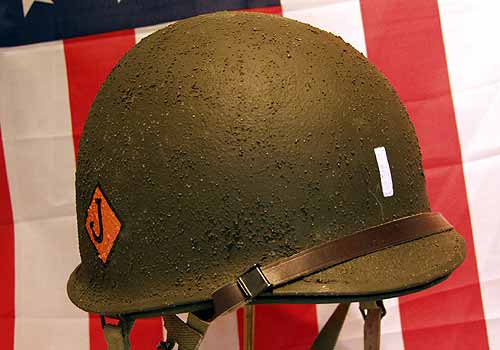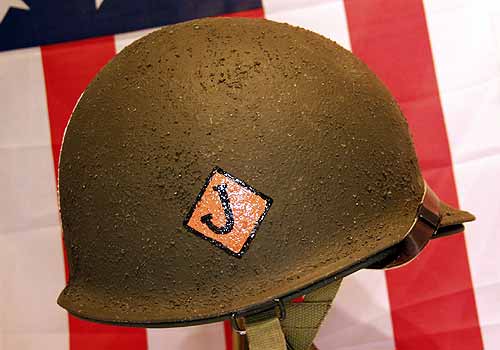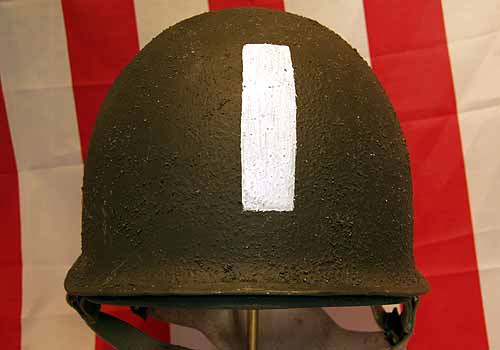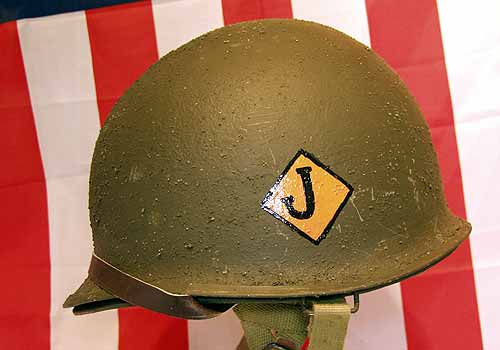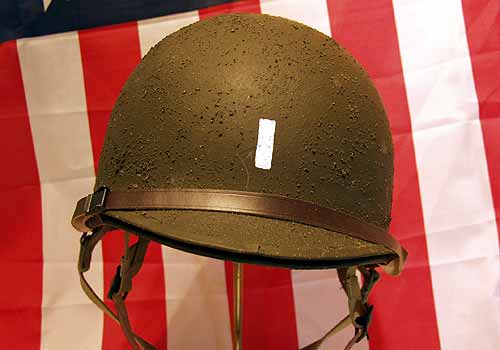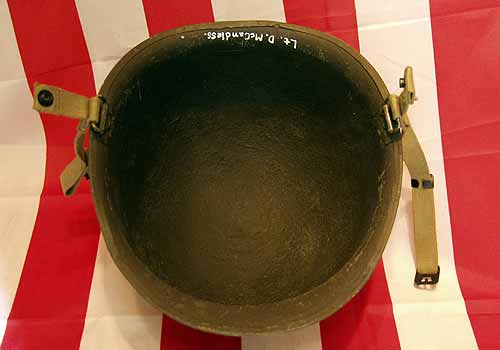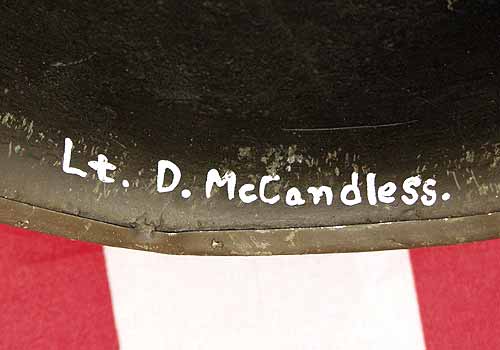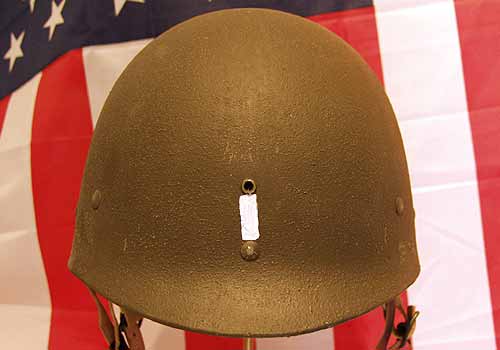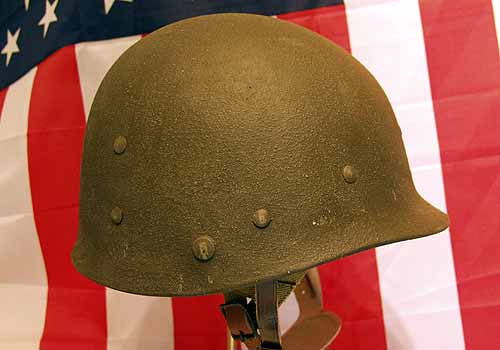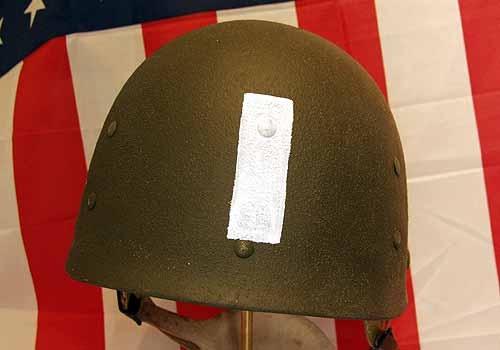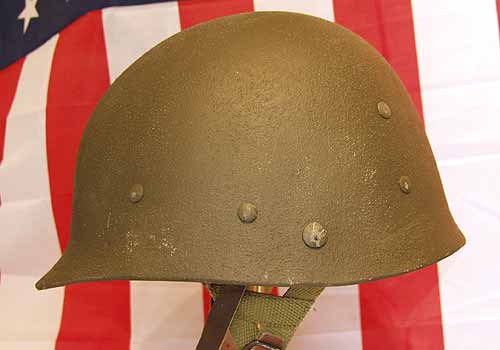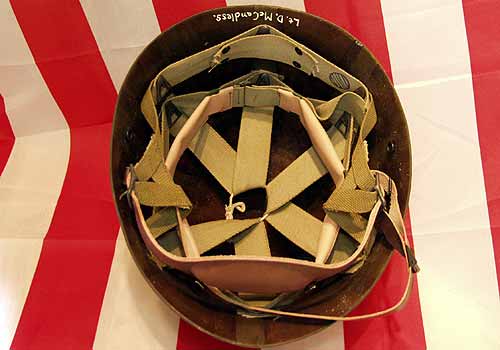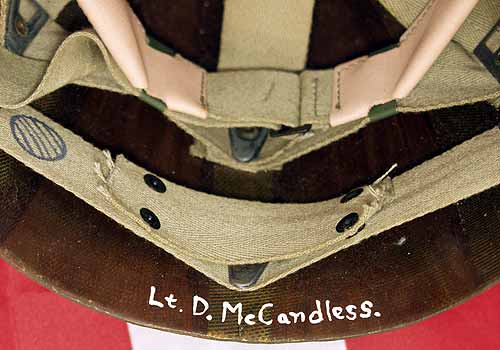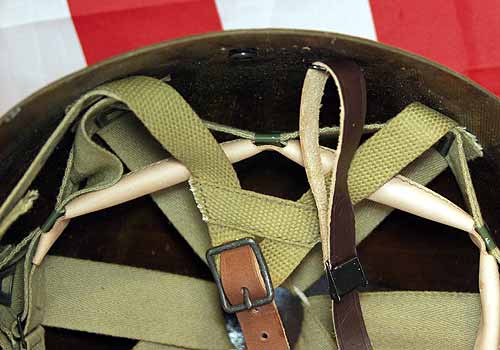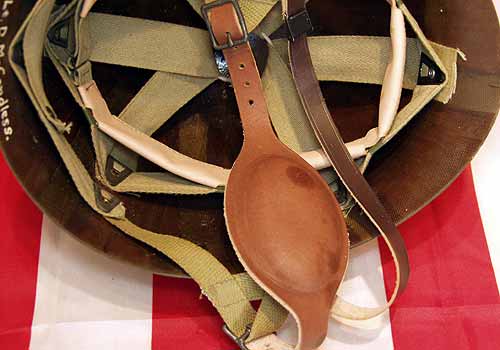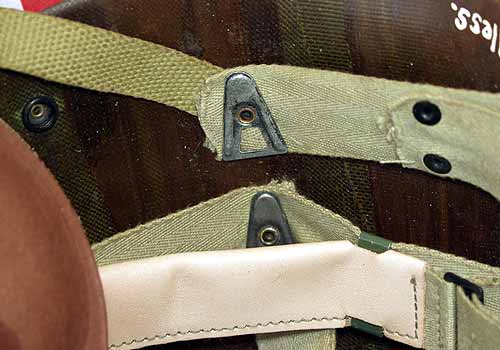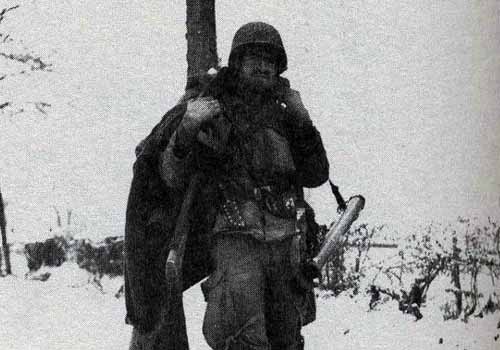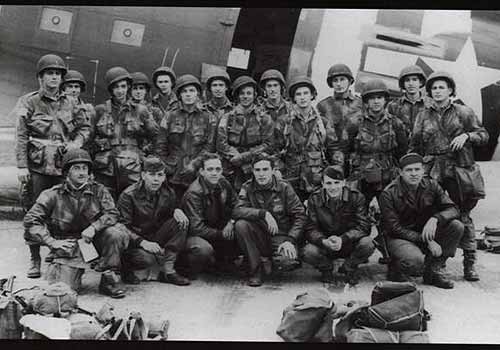 |
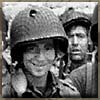 |
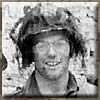 |
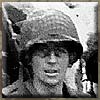 |
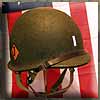 |
| Menu: |
| Home |
| Store |
| Buying |
| X-Sales |
| Info |
| FAQ's |
| Contact |
| Links |
M1C Helmet 505th Company PIR Lt. Dean McCandless 82'd Airborne: This is a refurbished WW2 helmet and refurbished & post war components, recreating the helmet worn by Second Lieutenant Dean McCandless Communications Officer with the 505th Parachute Infantry Regiment, 82'd Airborne. This helmet has been completely refurbished to look as if it has just been issued. The inside has been treated and painted but still has small pits and dents this is out of respect of the original owner. This is a genuine WW2 helmet! Unit History: Sicily: On 9 July 1943, just over a year after it's activation the 505th made the first regimental size combat parachute attack as part of Operation Husky under the capable leadership of Colonel James M. "Slim Jim" Gavin (above left) the 505th was organized into a Regimental Combat Team which included the 3rd Battalion of the 504th. As a staff officer in Airborne Command under General Lee, Colonel Gavin wrote "Instructional Pamphlet for Airborne Operations". These theories and observations would now be put to the test. Colonel James M Gavin - Commanding Officer of the 505th PIR - gives his men last minute instructions before Operation Husky. Their objective was to parachute behind enemy lines into an egg-shaped area around Gela, Sicily. They would then close off roads leading to beaches and secure the drop zone for further use. Especially important near the DZ was enemy-held Objective Y - a series of 16 concrete "pillboxes" from which German gunners controlled movement on nearby roads. However, Mother Nature did not cooperate. Salerno: A landing on mainland Italy took place in the early morning of 12 September 1943 at Salerno under General Mark Clark. Within 72 hours German Field Marshal Kesselring was poised to drive the Allies back into the sea. This set the stage for the 505th's second combat jump. On the night of 14 September 1943, Jim Gavin's 505th Parachute Infantry totaling roughly 2100 combat hardened paratroopers dropped onto the tenuous Salerno beachhead. It was an encore performance of the previous night's precise parachute jump by the 504th and no less spectacular. Within 24 hours these two units of the 82nd Airborne had jumped on short notice and shored up the faltering Salerno beachhead. D-Day: The largest combined military operation in history,"D-Day", was to be spearheaded by the 82d and 101st Airborne Divisions. Members of D Company 505th PIR Frank Tryba Platoon Visibility was hampered by poor weather conditions as the C-47's crossed the English Channel during the first hours of the 6th of June 1944. When the troop carriers finally did made landfall on the Cherbourg Peninsula they came under heavy German flak scattering many of the troop carrier flights. It was 0300 hours on 6 June 1944, when the 505th were given the green light to jump. Some Pathfinders were able to signal their dropzones. However, many of the troop carriers missed their dropzones and the All-Americans of the 505th began landing across a large swath of the countryside around Normandy. Nevertheless, the 505th PIR was one of the first airborne units to hit the ground and despite the subsequent confusion surrounding the landing, were able to use it to their advantage mustering enough troops under the command of the 2nd Battalion Commander, Lt. Col. Benjamin Vandervoort to liberate the first town in France, - St. Mere-Eglise. The paratroopers jumped prior to the actual start of the invasion "H-Hour". Because of the tradition of being the first into the fight, the 505th Regimental motto is "H-MINUS". For their performance in the invasions the 505th was awarded the Presidential unit citation, the unit equivalent of the Medal of Honor awarded to individual soldiers. In the words of author Clay Blair, the paratroopers emerged from Normandy with the reputation of being a pack of jackals; the toughest, most resourceful and bloodthirsty in Europe. Market Garden: On 9 September 1944 Field-Marshal Montgomery proposed a plan, called Operation Market Garden, to secure a bridgegehead across the Rhine. The operation called for a combined armor and airborne assault to seize and hold key bridges and roads deep behind German lines in Holland. The airborne phase of the operation consisted of capturing five bridges ahead of the armored force. Members of G Company 505th PIR at Suippe, France after Operation Market GardenOn 17 September 1944, as part of Operation Market Garden, the 505th made its fourth jump at Groesbeck, Holland, the largest airborne assault in history. During that fierce combat, two lightly armed platoons, at most 80 men, were surrounded by an entire German Infantry Battalion supported by tanks. The paratroopers fought back three savage German assaults and held their ground until relieved. The 505th received a second Presidential unit citation. Battle of the Bulge - The Ardennes Offensive: Suddenly, on December 16, 1944, the Germans launched a surprise offensive through the Ardennes Forest which caught the Allies completely by surprise. Two days later the 82nd joined the fighting and quickly blunted General Von Runstedt's northern penetration of the American lines above Bastogne. Meanwhile, on the morning of 19 December the 501st PIR of the 101st Airborne Division was digging in at Bastogne, as the Germans quickly infiltrated and cut off the road between the two elements and the "Battle of the Bulge" offensive flowed around the two airborne units. 505th PIR Company E - Ft Bragg 1942 Despite a lack of cold weather equipment once again airborne spirit, courage, and hard-nosed determination won the day as the 505th withstood the bleak winter and stopped the fanatic German attacks at Ste Vith and the Salm River. For its valor in the seven major campaigns of the European Theatre of Operations, the 505th was awarded two Distinguished Unit Citations and three Foreign decorations: the French Forragere, Netherlands Military Order of William, and Belgium Forragere. Outer Shell: The shell has been refurbished from an original WW2 helmet, it is a front seam swivel bail M1C model as used by the US Airborne in WW2. The painted decals are identical to the WW2 versions 'Jack of Diamond'. The inside has also been rust treated and painted. There is a Lieutenant's Rank insignia painted to the front, there is a 'Jack of Diamonds ' decal on each side and a officers stripe down the rear. The chin strap is the Airborne model with DOT popper studs. The name 'Lt. D. McCandless.' has been painted inside the shell rim. Liner: Most of the post war liner has been replaced with post war authentic webbing and accessories. The liner retaining clips are in olive green and the majority of the 'A' clips are treated steel. As stated above the liner is a M1C version. The outer liner also has the officers rank insignia and 'stripe' at the rear. Notice the M-1C DOT female sockets in the liner and the complete nape strap. The leather chin strap is also fully complete. This is a perfect helmet for display or reenactment purposes!
Please email me if you want to purchase this item, require more details. Insurance is included with postage costs. |
||||||||||||||||||||||||||||||

